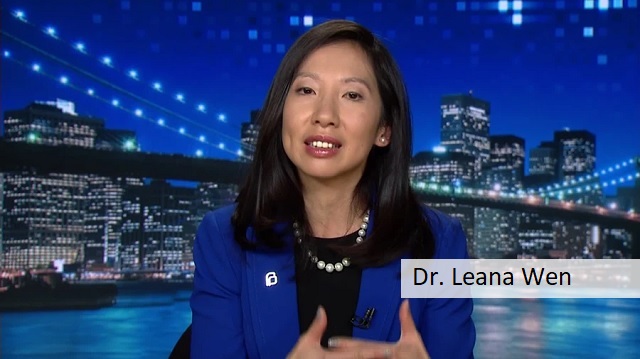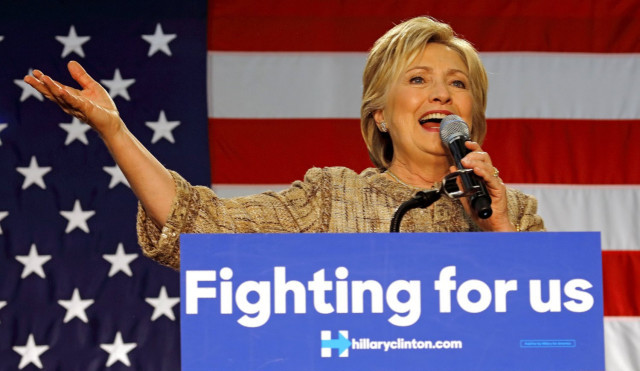CNN Medical Analyst Says Masking Stunted Her Toddler’s Language Development—and Taught Her an Important Lesson about Tradeoffs

A year ago, Dr. Leana Wen was arguing unvaccinated people shouldn’t be allowed to leave their homes. But now she says she’s abandoned her “extremely cautious” Covid views.
During the 1960s, the phrase “the personal is political” became a rallying cry for second-wave feminists challenging the social framework that existed at the time.
There was an unhealthy collectivist undercurrent to this idea—“There are no personal solutions at this time,” wrote Women’s Liberation Movement member Carol Hanisch in an essay on the topic, “There is only collective action for a collective solution”—but the phrase also contains an element of truth.
Personal experience does play an undeniable role in how many humans perceive politics and social structures, which brings me to CNN medical analyst Dr. Leana Wen.
‘I Accept the Risk’
Throughout the pandemic, Wen was in what I’ll call the “pro-mandate” camp.
In March 2021, she excoriated governors who rescinded or failed to pass mask mandates in their states.
“We are not out of the woods. We haven’t reached the end of the pandemic,” Wen said in a pro-mask CNN piece. “It’s counterproductive and truly infuriating these governors are treating this as if the pandemic is over. It’s not true.”
Later that year, she went so far as to argue that unvaccinated people shouldn’t be allowed to leave their homes.
“We need to start looking at the choice to remain unvaccinated the same as we look at driving while intoxicated,” Wen told CNN’s Chris Cuomo. “You have the option to not get vaccinated if you want, but then you can’t go out in public.”
.@DrLeanaWen: “There are privileges associated with being an American. That if you wish to have these privileges, you need to get vaccinated. Travel, and having the right to travel in our state, it’s not a constitutional right as far as I know to board a plane." pic.twitter.com/eyhEVooV20
— Tom Elliott (@tomselliott) September 10, 2021
A year later, Wen’s views have changed. In a recent Washington Post article, she explained why she’ll no longer be masking her children and how she shifted away from “being extremely cautious” with Covid protocols.
“I accept the risk that my kids will probably contract covid-19 this school year, just as they could contract the flu, respiratory syncytial virus and other contagious diseases,” she writes. “As for most Americans, covid in our family will almost certainly be mild; and, like most Americans, we’ve made the decision that following precautions strict enough to prevent the highly contagious BA.5 will be very challenging.”
Wen’s observations are not wrong. The new variants are less deadly, and this is particularly true for children, which has always been the case.
A year ago, when Wen was still advocating strict mandates, we pointed out that the CDC’s own data showed small children were at far greater risk of dying from the flu, drowning, vehicle collisions, cancer, and other things than Covid.
This data, for whatever reason, apparently did little to persuade Wen in 2021, however. What does appear to have changed her mind is that her child appears to have suffered from the mandates.
“Masking has harmed our son’s language development,” she bluntly asserts in the article.
‘There Is a Tradeoff’
Throughout the pandemic, few policies have been debated with more fury than mask mandates. The vast majority of these debates focus on a single point: does masking prevent or even reduce Covid transmission? Some studies say yes, others cast doubt on their efficacy.
For many, however, the efficacy of masking became a sort of dogma that could not even be questioned. (If you doubt this, consider that until a few days ago one faced risk of suspension on YouTube for suggesting that masks don’t play a role in preventing Covid transmission.)
Far less discussion focused on the costs of forcing people to wear masks, and Wen now sees this as a mistake.
“There is a tradeoff,” Wen says.
Many on Twitter have asked–how did I go from being extremely cautious with #covid19 precautions for nearly two years to now resuming pre-pandemic activities, including not masking my young kids at school?
I explain in this @postopinions column 🧵: https://t.co/3UGUxWvCH7
— Leana Wen, M.D. (@DrLeanaWen) August 23, 2022
Many, however, refused to acknowledge this and argued that masking is simply a moral imperative. I recently had a discussion at a family gathering with a person who supports mask mandates. He became indignant when my sister-in-law said she didn’t think it was right to force her children to wear masks at school all day long.
“It’s about protecting others,” he said. “It’s the smallest thing.”
The fact that he was not wearing a mask himself as he said this didn’t seem the least bit ironic to him, but it proved Wen’s point: there are tradeoffs. (If there was not, we’d wear them all the time.)
The idea of tradeoffs is perhaps the most basic principle in all of economics. It’s rooted in a simple idea: in order to have or do one thing, one must sacrifice having or doing something else. All things come with opportunity costs, big and small. (A minor tradeoff with masking is simply being able to breathe more freely.)
For most of the pandemic, many Americans and most public health officials refused to acknowledge the reality of tradeoffs. In 2021, The New York Times described a phenomenon known as “Covid Absolutism.” It consists of two primary factors: 1. Taking every conceivable step that could reduce the spread of Covid regardless of its actual effectiveness; 2. Downplaying or ignoring the unintended consequences and tradeoffs of these policies.
There is an important difference between taking steps that *appear* to reduce the spread of Covid and taking steps that actually reduce the spread of Covid.
A thread…
— David Leonhardt (@DLeonhardt) February 12, 2021
Who Gets to Choose?
Basic economics, however, teaches us the folly of this thinking.
“There are no solutions, there are only trade-offs,” Thomas Sowell famously observed.
This was the economic lesson Wen learned during the pandemic. She didn’t learn it in a classroom or in a textbook. She learned it in her personal experience when her own child began to struggle with language development (not a minor tradeoff), just like countless other children.
Writing in The Atlantic, Stephanie Murray also wrote about the reality of tradeoffs, stating that many parents with youngsters who are struggling see the potential benefits of masking as a poor trade for what they lose developmentally.
“Children with speech or language disorders offer perhaps the clearest example of these murky trade-offs,” she writes.
This is precisely why decision-making must be left to individuals, not bureaucrats. Nobody is more capable of weighing the pros and cons of a trade or action better than the people who themselves stand to lose or benefit from that trade or action (or in this care, their parents).
Dr. Wen no doubt knows a great deal about public health, just like Anthony Fauci and Rochelle P. Walensky. But even Fauci and Walensky, I suspect, would concede that it’s Wen who knows what’s better for her child.
It must be stressed that it’s not just that Wen wants what’s best for her child. It’s that she actually knows what’s best for her child because she has infinitely more knowledge about her child than any distant bureaucrat or meddling politician could ever possess.
Nobel Prize-winning economist F.A. Hayek detailed this “local knowledge” concept in his work exploring “the knowledge problem,” and he showed why central planners seeking to engineer society through force are capable of producing little beyond “planned chaos.” This is why it’s so important that freedom of decision-making is left to those who have the most local knowledge and can most accurately assess the risks and rewards of any given action.
The good news is that Wen, to her credit, appears to have learned something throughout the tragedy of the Covid pandemic, as have so many others.
The tragedy is that for so long she overlooked tradeoffs and used her platform to advocate coercive policies that deprived individuals of the ability to choose, a tragedy that is compounded by the fact that Wen now finds herself a target of cancellation for advocating a more sensible approach.
I'm on 3 immunosuppressants. COVID's been scary.
I never talk about this. Until I saw 600 experts publicly compare @DrLeanaWen to a supporter of eugenics bc she's come to oppose mandates.
They're doing this in the name of folks like me. I'd like to tell you why they're wrong.
— Billy Binion (@billybinion) August 25, 2022
It’s an ironic twist considering that only a year ago Wen herself was a proponent of confining unvaccinated people to their homes, and not one we should celebrate.
But hopefully it can be a learning experience for Wen and others, who now recognize the danger in turning what should be individual decisions over to bureaucrats and political tribes.
AUTHOR
Jon Miltimore
Jonathan Miltimore is the Managing Editor of FEE.org. His writing/reporting has been the subject of articles in TIME magazine, The Wall Street Journal, CNN, Forbes, Fox News, and the Star Tribune. Bylines: Newsweek, The Washington Times, MSN.com, The Washington Examiner, The Daily Caller, The Federalist, the Epoch Times.
RELATED ARTICLE: The CDC is Broken and Apologies Can’t Fix It: “We’ve Made Some Mistakes, But NOW You Can Trust Us!”
EDITORS NOTE: This FEE column is republished with permission. ©All rights reserved.




